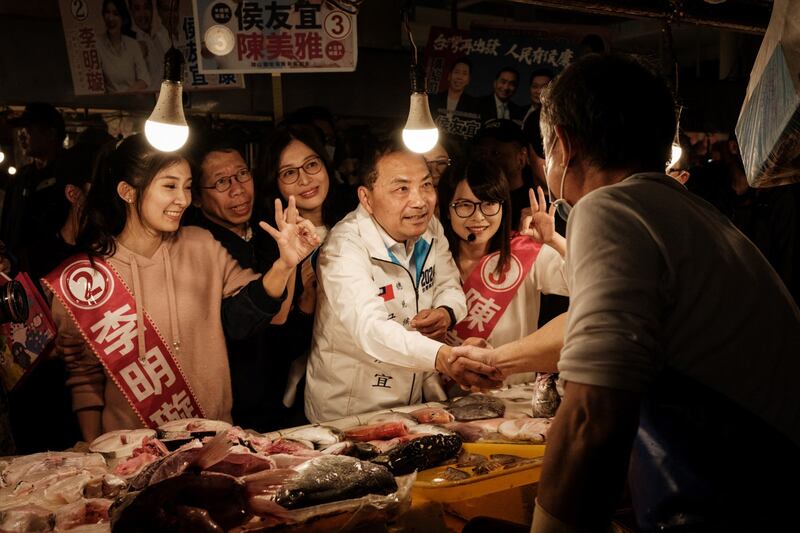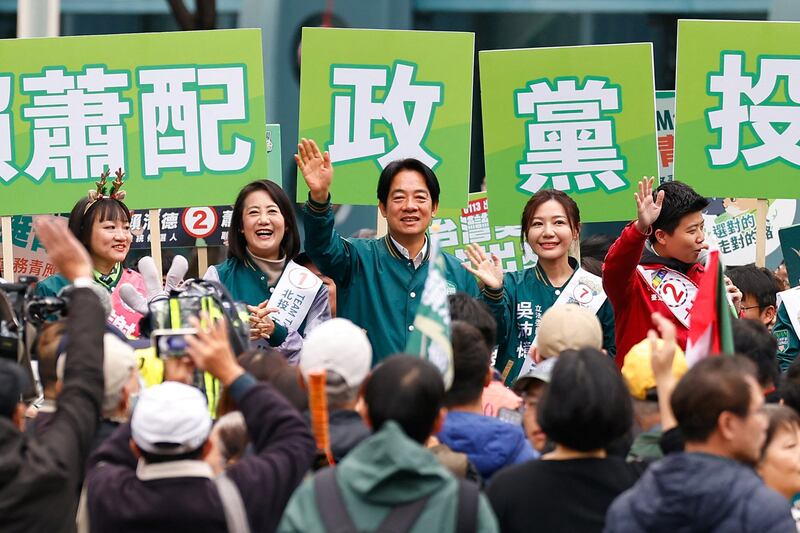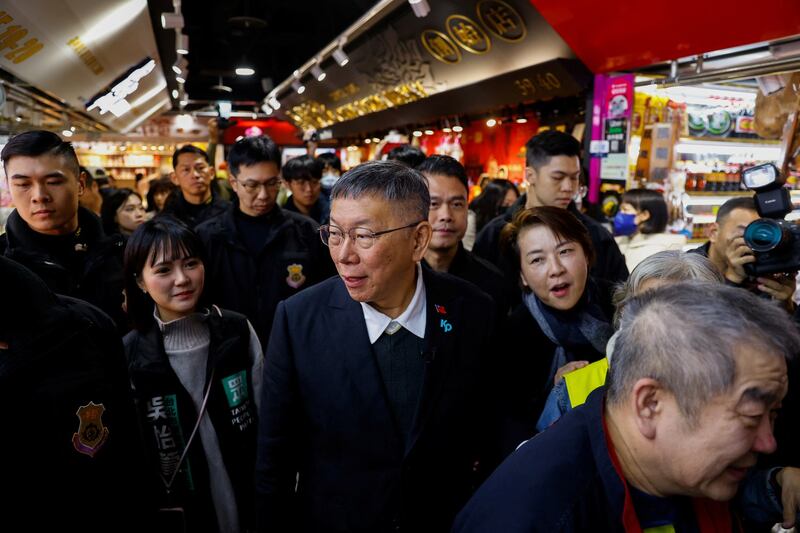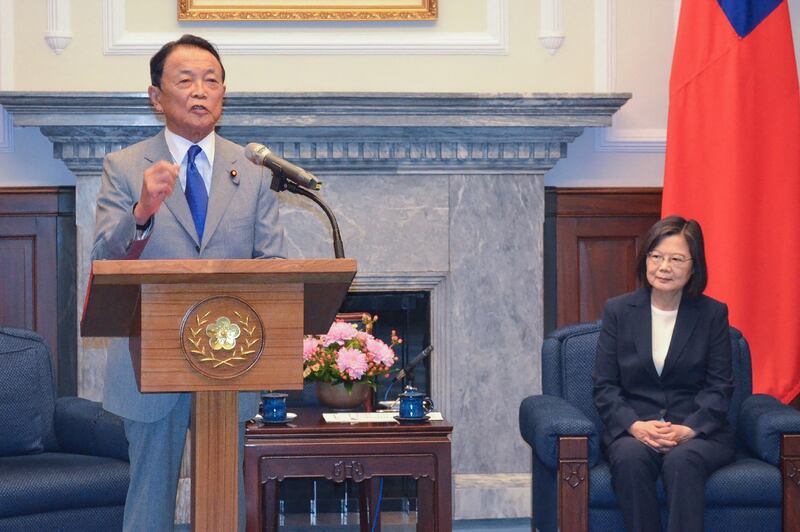For 40-year-old Taiwanese driver Hsiao Min-yu, Saturday’s presidential election is about picking a leader who can improve his economic prospects. Like others in his community, Hsiao has struggled with stagnant salaries and rising costs of living over the past few years. He hopes the next president can boost the economy so that his financial stress is lessened.
“We see the elections as a change of dynasties, the change of a government that can improve our livelihoods,” said Hsiao. “The past few years have been difficult, salaries haven’t increased but prices soared. If the economy improves, our stress from work may lessen.”
Hsiao’s concerns about Taiwan’s economic rebound are mirrored in key statistics, highlighting issues many voters face since the COVID-19 pandemic. In November, Taiwan’s statistics bureau reported a reduction in the island’s 2023 GDP growth forecast to just 1.42%, the lowest since the 2008 global financial crisis.
Furthermore, Taiwan is grappling with high housing prices, ranked among the highest globally, while its wage levels were among the lowest compared to other developed economies, according to March figures.

Yet while Taiwanese voters are focused on bread-and-butter issues, the election is being viewed internationally as a test of Taiwan’s political relations with China. The two leading candidates have staked out positions that foreign observers see as either promoting confrontation or peace with Beijing.
Relations with China have also soured under the incumbent Democratic Progressive Party, or DPP, hurting cross-strait trade, and the DPP candidate, Vice President Lai Ching-te, is now trying to project himself as the continuity candidate who will ensure stability going forward.
However, the differences between the DPP, the opposition Kuomintang, or KMT, and the upstart Taiwan People’s Party, or TPP, may not be as stark as commonly portrayed, especially on the defining issue of relations with China. All recognize the Taiwanese public prefers maintaining the status quo for now.

“The difference between the DPP, KMT, and TPP on relations with China is actually not as large today as we are given to believe,” said Joseph Liow, professor of comparative and international politics at Singapore’s Nanyang Technological University.
“While DPP is portrayed – especially by the Chinese media – as pro-independence, I think they have restrained themselves in recent years. Even Lai Ching-te has not been very vocal on this issue, certainly less so than his previous incarnations,” Liow added, noting that the KMT is very aware that its association with a pro-China stance has cost it politically, especially in 2020, in the wake of Hong Kong.
“They too have shifted their narrative away from an explicit focus on China to a more ambiguous dichotomy of ‘war and peace’ so to speak,” he said.
While the TPP has positioned itself as “not KMT or DPP,” he said it may not be a whole lot more different when it comes to cross-strait relations.
“Underlying the position of these three parties is the simple reality that the electorate by and large prefer the status quo. Their respective positions are variations of the status quo. But that means it is shades of gray and not black or white.”

Maintaining the status quo is considered the safest approach regardless of the outcome of Saturday’s election. Despite Beijing’s ongoing threats to use force to reclaim Taiwan, there’s little belief in an immediate invasion by China, according to experts who spoke to Radio Free Asia.
The conditions are prevalent: China’s economic and military might, Taiwan’s fight to preserve its freedom and identity, and turbulent relations between the United States and China, as well as Washington’s pledge to safeguard Taiwan’s interests.
Japan, South Korea
Taiwan's strengthening ties with the U.S. is similarly playing out with its former ruler Japan. Former Japanese Prime Minister Taro Aso warned this week that China's claims over Taiwan will "definitely become an existential crisis situation" for Japan, and Tokyo must fight in the Taiwan Strait in the event of conflict to rescue its citizens.
“If Japan was to move further to treat Taiwan as an independent country and a military ally that would certainly provoke China in a way that would be catastrophic for Taiwan and Japan,” said Koichi Nakano, a politics professor at Tokyo-based Sophia University.
He added retired Japanese self-defense force personnel are already frequently invited to Taiwan by the DPP, as are senior politicians.
“The only thing that has not been done yet is direct military-to-military contact between serving officers, and that would be a clear red flag for China.”
From Japan’s perspective, it is one thing for the Japanese that their former colony remains friendly, Nakano said, but it is another as to whether they are ready to fight a war for the first time in close to 80 years.
“The rightwing politicians in Japan are fond of making use of a possible Taiwan contingency as they seek to remilitarize Japan, but as a war with China gets more and more real, they will have to find a way to backpedal or face serious popular opposition. Few in Taiwan want a war with China. Is it surprising that even fewer Japanese want one over Taiwan?”

The same goes for South Korea.
If China were to start a war, the U.S. would naturally intervene, and South Korea, with its US military presence, would not be able to sit idly by, said Bumsig Ha, dean of Kaohsiung University’s department of East Asian languages and literatures.
“It is also important to remember that the U.S. does not want to see cross-strait relations deteriorate at this time. The U.S. is currently trying to resolve issues such as Ukraine and Israel. A war between China and Taiwan is a big risk for the U.S. to manage.”
Economic costs of a conflict
According to Bloomberg Economics, a war would cost US$10 trillion, or 10% of global GDP. What’s more, Taiwan’s strategic importance is tied to its semiconductor industry, which makes the world’s most advanced chips, led by the Taiwan Semiconductor Manufacturing Co., whose customers are the biggest U.S. tech companies.
“Taiwan’s global significance largely lies in its role as a major semiconductor provider. Beyond that, its value in international relations is limited,” said Kalim Chun, a professor at Hoseo University’s Department of Innovation and Convergence, who teaches China politics, regional politics and Sino-South Korea relations.
Chun added the island’s complex relationship with China means that other nations might face significant losses if they choose to align with Taiwan.
“After the election, Taiwan might attempt to connect with countries like South Korea and Japan to break out of its isolation. However, these countries may not be in a position to welcome Taiwan due to potential risks.”
For instance, he said it is unlikely that the Japan-led Comprehensive and Progressive Agreement for Trans-Pacific Partnership (CPTPP) will include Taiwan as a member regardless of the result of the election.

On the ground, geopolitics is intangible to most Taiwanese people who sit in the heart of it.
Any common ground with the world’s powers, according to Benjamin Ho, coordinator of the China programme at the S. Rajaratnam School of International Studies at the Nanyang Technological University, is the extent to which developments in the geopolitical and geoeconomic spheres actually affect the practical issues, like job opportunities, ability to buy a property and the economy’s performance.
“Depending on which side one’s bread is being buttered – some Taiwanese businessmen may be more pro-China because their businesses rely on China, while academics who cherish academic freedom may not be so enthusiastic – one would take different positions on these issues,” Ho said.
Additional reporting by Mike Firn and Taejun Kang.
Edited by Taejun Kang and Mike Firn.
